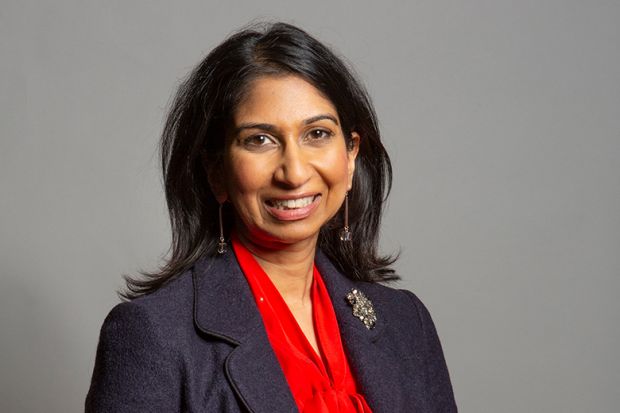University leaders have said they are “delighted” by the resignation of Suella Braverman as home secretary, after she threatened to put limits on international student recruitment, but have warned the higher education sector not to be complacent.
Ms Braverman – who had raised concerns about the “very high” number of international students and their dependants in the UK – resigned on 19 October following a security breach. National media reported that the backdrop to her departure was a clash with Liz Truss over immigration controls, with Ms Braverman resisting the prime minister’s plans to liberalise the regime – and sending details of the proposals to a backbench MP from her personal email.
The end of Ms Braverman’s 43-day tenure at the Home Office came as welcome news to vice-chancellors, who had warned that putting restricting overseas enrolment would have been “bizarre”, with growth in recent years having contributed billions to the British economy.
“It is a relief to see that proposals that would have had the effect of reducing the UK’s attractiveness to international students were quashed, thanks to support by multiple government departments,” Dame Janet Beer, vice-chancellor of the University of Liverpool, told Times Higher Education. “In the current climate it would have made no sense to undermine such an important source of economic growth and global influence.”
Writing on Twitter, Vivienne Stern, chief executive of Universities UK, said that she was “delighted that moves afoot over the last two weeks to make the UK less attractive to international students are off the table”.
Ms Stern said the shift reflected “widespread recognition that international students are great for the UK – for our universities; for our talent pool; for our international relationships and for economy of towns and cities in all parts of the UK”.
“But I don’t think we should be complacent,” Ms Stern added. “We need to make sure we have eyes in the back of our heads when it comes to any potential abuse of the system, and work with Home Office to maintain confidence in the system.”
Ms Braverman was replaced as home secretary by Grant Shapps, who is seen as being closer to the centre of the Conservative Party.
“The latest change of home secretary gives the government the opportunity to quietly drop the damaging, rehashed proposals that Suella Braverman floated to reduce the number of international student visas,” said Paul Blomfield, the Labour MP for Sheffield Central who co-chairs the All-Party Parliamentary Group on International Students.
“I hope this is the end of the Tories hauling out the distraction technique of targeting international students employed by Theresa May in times of trouble when she started as home secretary.
“It took several years of cross-party efforts to persuade the government to undo the damage, and I hope we won’t be facing that again under our third home secretary this year.”
International students contribute nearly £30 billion a year to the UK economy, enrich its universities and “bolster Britain’s place in the world”, he added.
“International students make an enormous contribution not just to campus life but socially and economically as well, and government policy should reflect that,” said Rachel Hewitt, chief executive of the MillionPlus group of modern universities.
“We hope the new home secretary will listen to the sector and recognise the important part that international students play across higher education and the whole of the country.”
Register to continue
Why register?
- Registration is free and only takes a moment
- Once registered, you can read 3 articles a month
- Sign up for our newsletter
Subscribe
Or subscribe for unlimited access to:
- Unlimited access to news, views, insights & reviews
- Digital editions
- Digital access to THE’s university and college rankings analysis
Already registered or a current subscriber? Login








